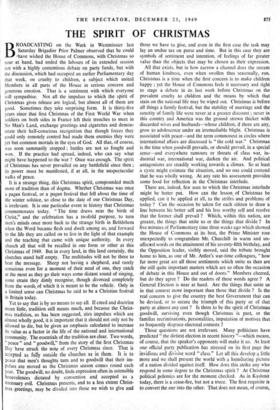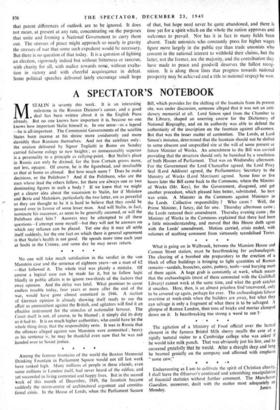THE SPIRIT OF CHRISTMAS
BROADCASTING on the Week in Westminster last Saturday Brigadier Prior Palmer observed that he could have wished the House of Commons, with Christmas so near at hand, had ended the labours of its extended session not with a highly contentious debate on party funds, but with the discussion, which had occupied an earlier Parliamentary day that week, on cruelty to children, a subject which united Members in all parts of the House in serious concern and generous emotion. That is a sentiment with which everyone will sympathise. Not all the impulses to which the spirit of Christmas gives release are logical, but almost all of them are good. Sometimes they take surprising form. It is thirty-five years since that first Christmas of the First World War when soldiers on both sides in France left their trenches to meet in No Man's Land, exchange greetings and cigarettes and demon- strate their half-conscious recognition that though forces they could only remotely control had made them enemies they were yet but common mortals in the eyes of God. All that, of course. was soon summarily stopped : battles are not so fought and won. If the practice had spread, indeed, who can say what might have happened to the war ? Once was enough. The spirit of Christmas has never prevailed on any battlefield since then ; its power must be manifested, if at all, in the unspectacular walks of peace.
It is a strange thing, this Christmas spirit, compounded much more of tradition than of dogma. Whether Christmas was once a pagan festival, or a pagan festival that fell about the time of the winter solstice, so close to the date of our Christmas Day, is irrelevant. It is one particular event in history that Christmas commemorates today. " The time draws near the birth of Christ." and the celebration has a twofold purpose, to turn men's minds once more back to the strange birth in Bethlehem when the Word became flesh and dwelt among us, and forward to the life they are called on to live in the light of that example and the teaching that came with unique authority. In every church all that will be recalled in one form or other at this Christmas of 1949. But in every land, in this land certainly, the churches stand half empty. The multitudes will not be there to hear the message. Sheep not having a shepherd, and rarely conscious even for a moment of their need of one, they catch at the most as they go their ways some distant sound of singing, some strain they dimly recognise, though divorced completely from the words,of which it is meant to be the vehicle. Only in a limited sense can Christmas be said to be a Christian festival in Britain today.
Yet to say that is by no means to say all. If creed and doctrine mean little, tradition still means much, and because the Christ- mas tradition, as has been suggested, stirs impulses which are almost wholly good, it is important that it should not only not be allowed to die, but be given an emphasis calculated to increase its value as .a factor in the life of the national and international community. The essentials of the tradition are clear. Two words, ,, peace " and " goodwill," from the story of the first Christmas Day have struck the note of every Christmas since. That is accepted as fully outside the churches as in them. It is to peace that men's thoughts turn and to goodwill that their im- pulses are moved as the 'Christmas season comes round each year. The goodwill, no doubt, finds expression often in ostensible benevolences dictated by convention and accepted as a necessary evil. Christmas presents. and to a less extent Christ- mas greetings, may be divided into those we wish to give and those we have to give, and even in the first case the task may lay an undue tax on purse and time. But in this case they are symbols of sentiment and intention, of feelings of far greater value than the objects that may be chosen as their expression.
All that exists, but in how narrow a channel does the stream of human kindness, even when swollen thus seasonally, run. Christmas is a time when the first concern is to make children happy yet the House of Commons feels it necessary and right to stage a debate in its last week before Christmas on the prevalent cruelty to children and the means by which that stain on the national life may be wiped out. Christmas is before all things a family festival, but the stability of marriage and the sanctity of family life were never at a greater discount ; never in this country and America was the ground strewn thicker with discarded wives and husbands—whose children, if there are any, grow to adolescence under an irremediable blight. Christmas is associated with peace—and the term commonest in circles where international affairs are discussed is " the cold war." Christmas is the time when goodwill prevails, or should prevail, in a special sense—and everywhere rumours or threats of class war, in- dustrial war, international war, darken the air. And political antagonisms are steadily working towards a climax. So at least a cynic might estimate the situation, and no one could contend that he was wholly wrong. At any rate his assessment provides some food for reflection in the Christmas interlude.
There are, indeed, few uses to which the Christmas interlude might be better put. How can the lesson, of Christmas be applied, can it be applied at all, to the strifes and problems of today ? Can the occasion be taken for each citizen to draw a line between his better self and his less worthy self and resolve that the former shall prevail ? Which, within this nation, are greater, the things that unite us or the things that divide ? In five minutes of Parliamentary time three weeks ago which showed the House of Commons at its best, the Prime Minister rose unexpectedly to congratulate Mr. Churchill in warm and un- affecled words on the attainment of his seventy-fifth birthday, and the Opposition leader, visibly moved, said the tribute brought home to him, as one of Mr. Attlee's war-time colleagues, " how far more great are all those sentiments which unite us than are the still quite important matters which are so often the occasion of debate in this House and out of doors." Members cheered, but do they agree ? Do the readers of these words agree ? A General Election is near at hand. Are the things that unite us in that context more important than those that divide ? Is the real concern to give the country the best Government that can be devised, or to secure the triumph of this party or of that party at almost any cost ? Is there to be the spirit of Christmas goodwill, surviving even though Christmas is past, or the familial recriminations, personalities, imputation of motives that so frequently disgrace electoral contests ?
. Those questions are not irrelevant. Many politicians have predicted " the dirtiest election in recent history "—which means, of course, that the speaker's opponents will make it so. At least one official party publication has stressed on its first page the invidious and divisive word " class." Let all this develop a little more and we shall present the world with a humiliating picture of a nation divided against itself. How does this strike any who respond in some degree to the Christmas spirit ? At Christmas political polemics are for the moment checked. As in Kashmir today, there is a cease-fire. but not a truce. The first requisite is to convert the one into the other. That does not mean, of course. that patent differences of outlook are to be ignored. It does not mean, at present at any rate, concentrating on the purposes that unite and forming a National Government to carry them out. The stresses of peace might approach so nearly in gravity the stresses of war that some such expedient would be necessary. But there is no question of that today. It is a question of fighting an election, vigorously indeed but without bitterness or rancour, with charity for all, with malice towards none, without exalta- tion in victory and with cheerful acquiescence in defeat. Some political speeches delivered lately encourage small hope of that, but hope need never be quite abandoned, and there is time yet for a spirit which on the whole the nation approves and welcomes to prevail. Nor has it in fact in many fields been absent. Trade unionists who constantly press for higher wages figure more largely in the public eye than trade unionists who consent in the national interest to withhold their claims, but the latter, not the former, are the majority, and the contribution they have made to peace and goodwill deserves the fullest recog- nition. It is along those lines that progress towards national prosperity may be achkved and a title to national respect be won.



































 Previous page
Previous page